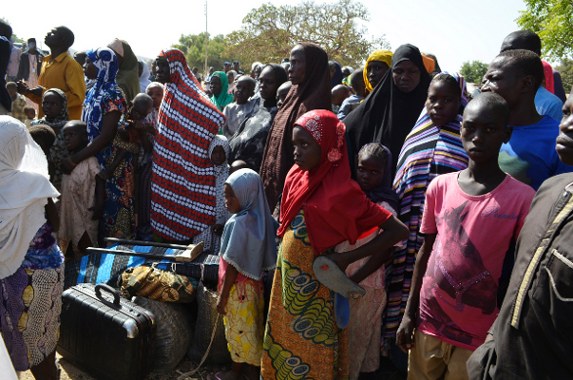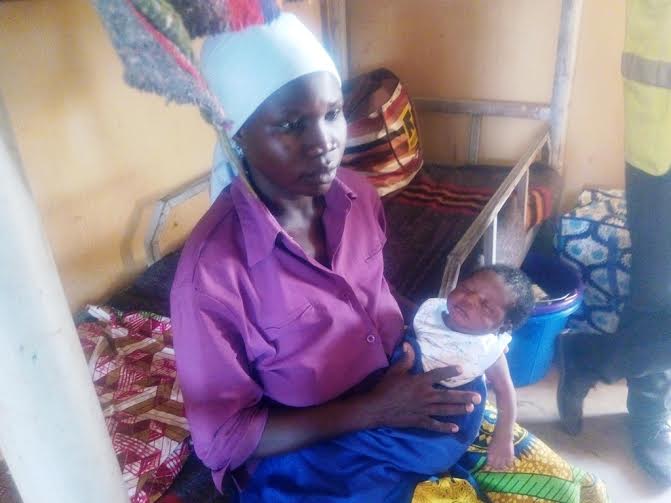The registered trustees of the socio-economic rights & accountability project (SERAP) have instituted a law suit against the federal government at the ECOWAS community court in Abuja over the “immense suffering” of internally displaced persons (IDPs) across the country.
Adetokunbo Mumuni, executive director of SERAP, said Mohammed Adoke, attorney-general of the federation, was joined as defendant in the suit
In Suit No ECW/CCJ/APP/15/15 filed last week by Femi Falana (SAN), solicitor to SERAP, the plaintiff accused the defendants of “serious violations” of the human rights of the IDPs to life, health, adequate housing, personal integrity, privacy, fair trial, freedom of movement and residence, judicial guarantees, private property and child rights guaranteed by the African Charter on Human and Peoples’ Rights, the African Union Convention for the Protection and Assistance of Internally Displaced Persons in Africa; and Principles 1-30 of the UN Guiding Principles on Internal Displacement.
“The response by the Nigerian government to the conditions of IDPs is fragmented and inadequate, as illustrated by defendants’ closure of several displacement camps in central and northern areas of Nigeria. Those living in camps are often left without enough food, essential household items or health facilities,” a part of the suit read.
Advertisement
“The increased vulnerability of IDPs across Nigeria demands accountability and greater level of respect for the full and effective realisation and enjoyment of IDPs rights in Nigeria. The ‘crisis of security’ created by forced internal displacement leaves IDPs unprotected, with women and children disproportionately affected. This condition of special vulnerability creates an obligation for the Nigerian government to adopt positive measures to ensure protection and security for IDPs, even when the displacement is caused by the actions of third parties.
“The Nigerian government has continued to fail and/or neglected to respect, protect, fulfil and promote the human rights of IDPs by among others failing to meet their protection and assistance needs, including social and work relations, and their family dynamics, to provide health facilities to meet their physical and mental health needs. The Nigerian government has also failed to systematically assess the conditions and situation of the IDPs across the country. In other words, the Nigerian government has failed to exercise due diligence and to act proactively to assist IDPs, many of whom do not have a home to go back to.”
The plaintiff contended that the origins, complexity and manifestations of the IDP crisis in Nigeria need to be placed within the context of a larger human rights problem in the country. it added that the human rights challenges posed by internal displacement in Nigeria shows that the Nigerian government is failing to meet its clear obligations and commitments under the African Charter on Human and Peoples’ Rights and other international instruments highlighted above.
Advertisement
“The plaintiff contends that the right not to be forcibly displaced is a key component of the right to freedom of movement and residence. The plaintiff also argues that the vulnerable condition of IDPs is a violation of the right to personal integrity. The plaintiff contends that internal displacement entails massive, systematic and prolonged violations of several human rights, thus preventing IDPs from leading a ‘dignified life’. This is an expanded interpretation of the ‘right to life’, thereby broadening the nature of protection from mere relatives.
“It is hereby submitted that under the African Charter on Human and Peoples’ Rights to which Nigeria is a signatory, the defendants have individually and collectively violated the human rights of IDPs to life, to health, to adequate housing, to personal integrity, to privacy, to fair trial, to freedom of movement and residence, to judicial guarantees, to private property and child rights.
“The plaintiff contends that the grave deterioration of the vulnerability of the living conditions of the over 3 million IDPs across the country, and the persistence of the impunity of those responsible for the violations of the human rights of IDPs. amount to serious breaches of the obligations and commitments of the Nigerian government under international law.”
SERAP, therefore, asked the ECOWAS Court of Justice, to declare that the failure and/or lack of due diligence by Nigerian government to proactively and effectively implement and promote IDP policies and allocate sufficient resources to IDP protection and the corresponding failure to effectively address the magnitude of the problem, is unlawful, as it constitutes serious breaches of Nigeria’s human rights obligations under the African Charter on Human and Peoples’ Right; the International Covenant on Civil and Political Rights and the International Covenant on Economic, Social and Cultural Rights, the African Union Convention for the Protection and Assistance of Internally Displaced Persons in Africa and other international human rights treaties to which Nigeria is a state party.
Advertisement
It also asked for “a declaration that the failure and/or lack of due diligence by the Nigerian government to proactively pursue the rehabilitation of surviving victims and the corresponding continuing exposure of victims to violence, abuse, marginalisation, impoverishment and social disarticulation caused by their loss of residence, property and livelihood is unlawful as it violates is unlawful as it violates the right to life, and to the security; dignity of the human person, and the right to health guaranteed under the African Charter on Human and Peoples’ Rights”; as well as “a declaration that the conditions faced by IDPs in Nigeria are inhumane and degrading and therefore unlawful as they amount to serious breaches of the international obligations and commitments of the Defendants to provide an effective remedy to victims of human rights violations.”
In addition, it demanded “an order finding the Nigerian government responsible for these human rights violations; an order directing the Nigerian government to allow and facilitate a safe and dignified return to all displaced persons who want it, within a period of six months; an order directing the defendants and/or their agents individually and/or collectively to promote, respect, secure, fulfil and ensure the IDPs’ human rights to life, to health, to adequate housing, to personal integrity, to privacy, to fair trial, to freedom of movement and residence, to judicial guarantees, to private property and child rights; an order directing the defendants and/or their agents individually and/or collectively to provide necessary and sufficient resources and effective protection for the victims of displacement to resettle in similar conditions found before the facts of the case and in a place that they freely and voluntarily choose.”
It further asked for “an order directing the defendants and/or their agents individually and/or collectively to keep and publish IDPs’ Register, with complete information on the number of those displaced since 2010, and information on age, sex, level of education, place of origin of the displaced, reasons for the displacement, etcetera, information on the establishment of explicit channels for those affected by displacement to be able to claim from the State special measures of protection, emergency humanitarian assistance, and support for return or relocation, among other matters; and an order directing the defendants and/or their agents individually and/or collectively to pay adequate monetary compensation of $300 million (US Dollar) to the IDPs for the violation of their human rights the subject matter of this suit, and to provide other form of reparation, which may take the form of restitution, satisfaction or guarantees of non-repetition, and other forms of reparation that the Honourable Court may deem fit to grant.”
Advertisement
Add a comment






